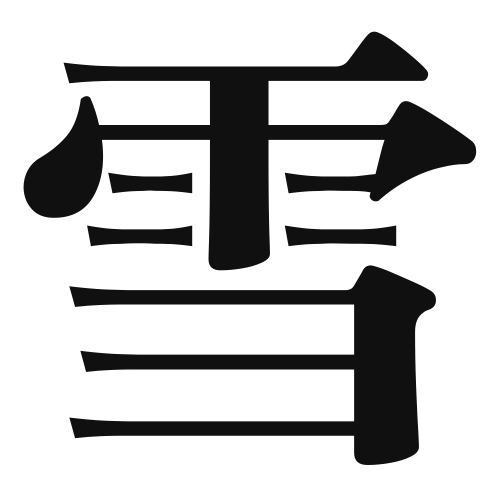1. Overview of Meaning
The kanji “雪” (yuki) means “snow.” It represents the frozen precipitation that falls from the sky during winter, creating a beautiful and serene landscape.
2. Formation and Radical
Formation of the Kanji: The kanji “雪” is a pictogram, originally depicting snowflakes. It is classified as a phonetic-ideographic character, where the shape suggests its meaning.
Radical: The radical for “雪” is 雪 itself, which is used in other kanji related to snow and cold weather.
3. Examples of Usage
Common Words and Phrases:
- 雪だるま (yukidaruma) – snowman
- 雪景色 (yukigeshiki) – snowy landscape
- 雪合戦 (yukigassen) – snowball fight
Example Sentences in Daily Conversation:
- 今日は雪が降っています。(Kyou wa yuki ga futteimasu.) – It is snowing today.
- 雪だるまを作りましょう。(Yukidaruma o tsukurimashou.) – Let’s make a snowman.
4. Synonyms and Antonyms
Similar Kanji:
- 霜 (shimo) – frost, which refers to the icy crystals that form on surfaces.
- 氷 (koori) – ice, which is frozen water, different from snow in its form and occurrence.
Antonyms:
- 晴れ (hare) – clear weather, representing the absence of snow and cold.
- 暑い (atsui) – hot, which is the opposite of the cold associated with snow.
5. Cultural and Historical Background
Connection to Japanese Culture: Snow holds significant cultural importance in Japan, often symbolizing purity and tranquility. It is celebrated in various festivals and traditional arts.
Proverbs and Idioms:
- 雪月花 (setsugekka) – “snow, moon, and flowers,” representing the beauty of nature in different seasons.
- 雪の下に隠れた草 (yuki no shita ni kakureta kusa) – “grass hidden under the snow,” symbolizing hidden potential or beauty.
